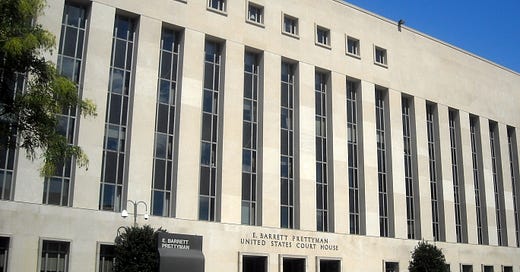If the polls are right and Donald Trump is the Republican nominee for president in 2024, we will face yet another unprecedented test of our democracy. Trump is currently under indictment, in two different cases, for unlawfully trying to overturn the last presidential election and remain in power.
Before casting their ballots, voters need to know whether Trump has been found criminally responsible for the events that led up to the Capitol riot on January 6, 2021. Indeed, it’s hard to imagine asking voters to choose without knowing the answer to that question.
But there’s a real danger that could happen. We could arrive at election day 2024 with Trump on the ballot and all of his criminal cases unresolved, including the D.C. federal case that accuses him of election interference. I explained why, and what can be done about it, in a guest essay in the New York Times today. Here’s a free link to my column:
Why Judges in the Trump Jan. 6 Trial Need a Rocket Docket - New York Times
On this issue, all eyes should be on the D.C. federal case charging Trump with conspiring to overturn the last election. As we’ve discussed here before, the Mar-a-Lago documents case in Florida is bogged down in disputes over handling classified materials, with a Trump-appointed judge who shows little interest in moving the case along. The unwieldy Georgia state RICO prosecution seems destined to drag on for many months, even if trial begins in August as the DA has proposed. Meanwhile the New York state “hush money” case, the first indicted but weakest and least significant of the four, has receded into the background, with the judge indicating he is willing to delay trial and defer to the federal prosecutions.
The Washington, D.C. federal courthouse
The D.C. case has the best chance of going to trial before November 2024. Fortunately, it also involves the charges most directly relevant to Trump’s fitness for office. Special Counsel Jack Smith has charged that as President, Trump conspired to defraud the U.S. government, obstruct the vote certification by Congress, disenfranchise voters, and unlawfully keep himself in power.
Whether or not Trump is guilty of these crimes is something voters need to know. But as I noted in the column, pre-trial appeals in the D.C. case could easily delay his trial for more than a year. Everything depends on whether the judiciary will step up and keep the case on track by putting those appeals on a very expedited schedule.
Quick promotional break: a reminder that my Cyber Monday Week special is still going on - 20% off an annual paid subscription.
If the criminal cases are all unresolved and Trump wins the election, he hopes to be able to make his legal problems go away. He can order his Justice Department to abandon the federal cases, and can almost certainly get the state prosecutions at least postponed while he is in office. If that happens, he will truly be above the law — and something fundamental about our country will have been lost.
Jack Smith and his team clearly are laser-focused on this issue. In one of their recent filings, they essentially asked Judge Chutkan to please hurry up and decide Trump’s motions so they could start doing everything possible to expedite any pretrial appeals.
It’s a little scary to consider how much the fate of our democracy may depend on the willingness of a few judges — including a number appointed by Trump — to act quickly. They control the schedule. If they treat this like a typical case, refusing to fast-track the arguments or waiting months before issuing their opinion, prosecutors will be virtually powerless to do anything. We’re seeing that play out right now in the federal case in Florida, where Judge Cannon’s foot-dragging has made it practically impossible for that case to make it to trial in 2024.
Trump claims his prosecution is a political witch hunt, that he did nothing wrong, and that the Constitution insulates him from prosecution. As with his claims about the 2020 “rigged” election, these claims need to be tested in a court of law, not merely spouted on Truth Social or at campaign rallies. And for voters to be fully informed, that needs to happen before November 2024.
Let’s hope the courts are willing to step up and do what’s necessary. Our democracy itself may hang in the balance.




